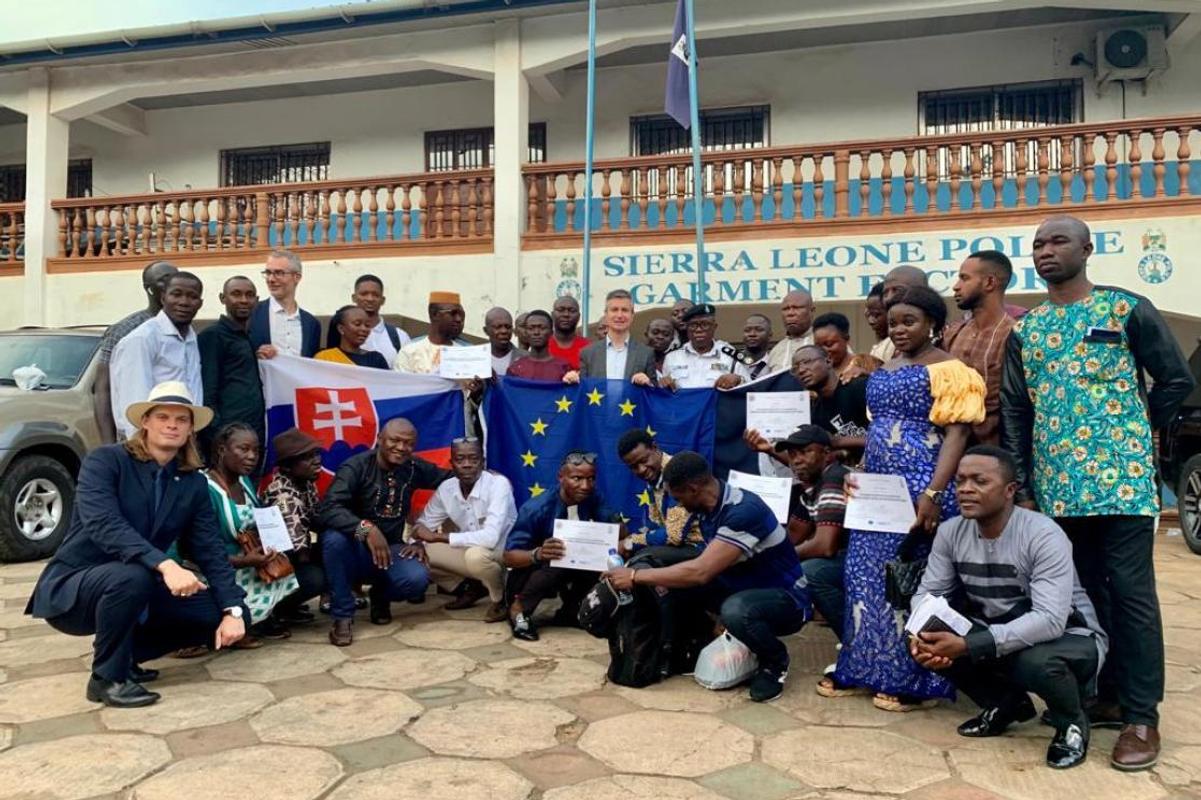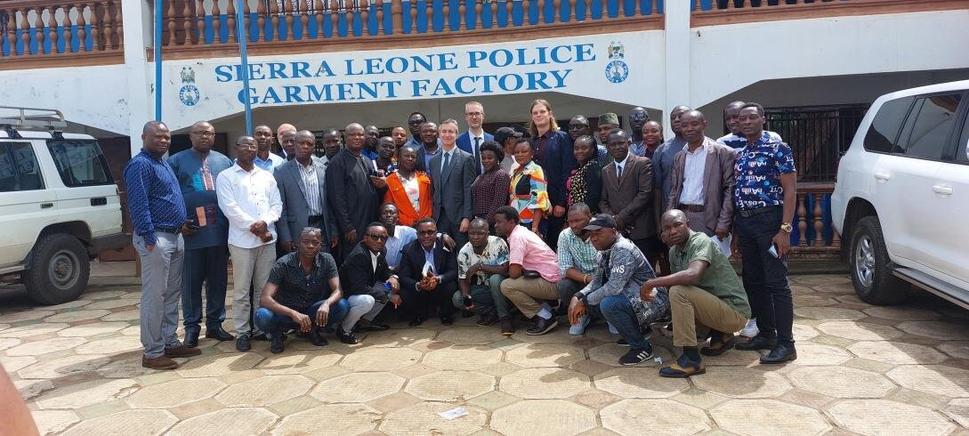Many Sierra Leoneans believed a hot salt bath would cure them of the Ebola virus or prevent them from getting it, but people continued to die.
The rumour about the bath spread at the speed of light across Sierra Leone, one of the world’s poorest countries inhabited by more than 8 million in West Africa. Social media, phone calls, and even town criers and some religious and government leaders encouraged people to bathe in hot salt water.
Startled, Sierra Leone journalist Umaru Fofana shared her experience in a short story published by a local news website.
“The clattering sounds of pots and pans in pantries in my surroundings that early morning had to wake me up,” she wrote in August 2014. “That was quickly followed by telephone phone calls from my parents in the north, relatives and friends in the southeast and in Freetown [Sierra Leone’s capital]. While some called to know if the rumours about the hot salt water bathing were true, others were entreating me to pay heed and do the wash myself.”
Several days prior, the World Health Organisation debunked the disinformation on social media.
The virus outbreak lasted in Sierra Leone for two years before it was declared Ebola-free in 2016. By then, nearly 4,000 people had died of the virus.
Disinformation, which often reaches Sierra Leoneans through word of mouth as well as social media and poor-quality journalism, has grown into a serious problem in the West African country.
Recently, the EU sent two representatives of the Slovak police to Freetown to train the Sierra Leone Police and the Armed Forces on Europe’s best practices on how to recognise and respond to disinformation.
To succeed, image and communication matter
The European Commission selected Slovakia and its police forces because of its intense fight against disinformation on Facebook.
Forty members of different intelligence service units took part in a three-day training in mid-October.
“We wanted to explain to them that if their police are to become respected, their representatives must also pay attention to communication, such as the ability to share enough information with the public,” said Michal Slivka, head of the Slovak police’s public relations department.
On Facebook, more than 490,000 people follow the Slovak police’s content. Its other Facebook page, established in 2018, which debunks hoaxes and scams, has 141,000 followers.
Slovaks lectured a group of Sierra Leone officers on basic terms, how the police in Slovakia fought disinformation during the coronavirus pandemic, but they also cited the police’s failures, such as a slower reaction time and the absence of proactive communication.
The head of the PR department went on to stress that the image of security forces also matters, as it has a considerable impact on their credibility and people’s trust in them.
The European Union criticised the low trust in Sierra Leone’s police forces in its 2021 report.
In the summer, Sierra Leone President Julius Maada Bio sacked the country’s problematic police chief, Ambrose Sovula, following a scandal concerning a cocaine container. The police under his leadership tried to sweep the scandal under the rug, according to local media reports. Some media in the country had, moreover, described Sovula as a puppet in President Bio’s hands.
“We repeatedly emphasised to the participants that if their police want to build a good name and win the trust of the population, the police must be independent and democratic,” Slivka said. “They cannot serve any party currently in power.”
Sierra Leone has long been divided into two political camps: the Sierra Leone People’s Party (SLPP), of which President Bio is a member, and the All People’s Congress (APC).
Training described as useful ahead of elections
Martin Lavahun, deputy director general of the Central Intelligence Security Unit, said the training with Slovaks came at the right time.
At the start of the training, he explained that social media and its misuse in Sierra Leone is an issue, describing it as a major national security threat since disinformation continues to affect governance.
Seen as ‘partly free’ by Freedom House, the West African country will hold general and presidential elections in June 2023.
Political tension has been growing in Sierra Leone, a country had been involved in a decade-long civil war until the early noughties. A few months ago, in August, the country saw deadly street demonstrations against rising food and fuel prices, and human rights abuses.
Amnesty International cites human rights issues in Sierra Leone in its latest report.
Yet, President Bio claimed that the protestors and the opposition, led by the All People’s Congress, had tried to overthrow his rule.
“This is an example that even protests can be affected by misinformation, and that is why open, fast and factual communication is the best prevention,” Slivka noted.
With the elections approaching, the Sierra Leone Police’s director of training, Sylvester Koroma, appealed to the EU to make the training package available to his department in order to share it with the local police departments scattered around the country.
The request appears to be rational.
The last elections, in 2018, saw the wide circulation of a fake report on WhatsApp and rumours in the streets, which claimed that Bio had won the presidential race already in the first round, in addition to other false rumours.
EU Deputy Head of Delegation to Sierra Leone, Juan Antonio Frutos, expressed his hope that the country’s intelligence services would use acquired knowledge to handle information and disinformation on social media, bearing in mind freedom of speech, praising the quality and efforts of the trainees.
Several days after the training, the Sierra Leone Police created their Facebook Page. It had 39 followers on November 21. “Of course, now it's necessary to promote the page more, to gain fans, which seems like the most difficult task,” Slivka said, adding that the Slovak police remain in touch with the training participants.
This is not the first time the EU supported the country in the fight against disinformation. In the course of the coronavirus pandemic, the Union joined forces with the country’s Association of Journalists in launching nationwide broadcast programmes to counter fake news related to the coronavirus.
“Fake news and misinformation are a clear and present danger, not only to the fight against the coronavirus, but also the peace and security of the nation,” the association’s president Ahmed Sahid Nasralla said two years ago.
The project ran for three months.
Influencers have gone political
The media in Sierra Leone remain to be influenced by political actors, and disinformation and misinformation can easily reach people living in urban areas, according to Sierra Leone journalist Francis Sowa. In his February 2022 report, “Sierra Leone’s Fake News Ecosystem”, he points out people from the cities can subsequently spread misleading information to the offline realm, to people in remote villages.
Sierra Leone also has a growing number of politically affiliated influencers, Sowa stresses.
“Sierra Leone’s information ecosystem is increasingly polarised with the supporters of one political party diligently questioning the credibility of information produced by its main opponent, and vice-versa,” the journalist writes. “This provides an environment in which fake news can flourish in the country.”
However, there are a few websites that debunk fake news, including the Centre for Journalism Innovation and Development’s Dubawa project.
In addition, Frutos, of the EU’s delegation to the country, said after the training that the EU is committed to supporting Sierra Leone’s peace and democracy, including similar workshops on fighting disinformation.
The Slovak police have not ruled out taking part in another training again, but it first wants to see some positive results by the Sierra Leone Police when it comes to dealing with fake news.
“For us, it will be crucial to see how much progress the local police will make,” Slivka said. “How they will communicate with the public, and whether they will stick to apoliticality and democracy.”


 Two Slovaks trained 40 members of the Sierra Leone Police and Armed Forces in fighting disinformation in October 2022. (source: Delegation of the European Union to Sierra Leone )
Two Slovaks trained 40 members of the Sierra Leone Police and Armed Forces in fighting disinformation in October 2022. (source: Delegation of the European Union to Sierra Leone )
 The training was held from October 12 to 14, 2022, at the Sierra Leone Police Emergency Call Centre, Kingtom, in Freetown. (source: Delegation of the European Union to Sierra Leone )
The training was held from October 12 to 14, 2022, at the Sierra Leone Police Emergency Call Centre, Kingtom, in Freetown. (source: Delegation of the European Union to Sierra Leone )